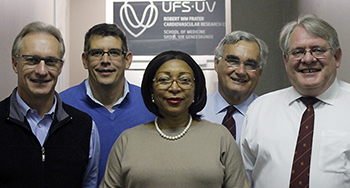Latest News Archive
Please select Category, Year, and then Month to display items
03 March 2021
|
Story Giselle Baillie
|
Photo Supplied
_web.jpg?sfvrsn=987e6620_1) Residence members who led the project, included:
Bohlokwa Rantja, the Residence Prime, and Transformation Committee members Nsuku Mutemela, Ofentse Motlakeng, Phindile Tjale, Madinku Mabala, Mmapopi Motshoso, Karabo Shuping, and Tagane Sekete.
Residence members who led the project, included:
Bohlokwa Rantja, the Residence Prime, and Transformation Committee members Nsuku Mutemela, Ofentse Motlakeng, Phindile Tjale, Madinku Mabala, Mmapopi Motshoso, Karabo Shuping, and Tagane Sekete.
The University of the Free State (UFS) Council approved and adopted Lehakwe House as the new name for the
NJ van der Merwe residence on the Bloemfontein Campus. The approval on 26 November 2020 followed a lengthy process of deliberation, consultation, and public engagement that has taken place since November 2019 and is aligned with the UFS Policy on Naming and Renaming. The name-change process was initiated by the Prime and Transformation Committee of the residence, guided by the
Unit for Institutional Change and Social Justice and supported by a multi-stakeholder committee representative of the residence, the Housing and Residence Affairs Office, the Department of Student Affairs, the Student Representative Council, and alumni.
Lehakwe – a precious gem
Following a lengthy evaluation process of the names submitted through a public voting and recommendation platform in July 2020, ‘Lehakwe’ – a Sesotho word referring to a ‘precious gem’ – emerged as the front runner. As many current and past members of the residence attest, this womxn’s residence has come to occupy a significant space within the hearts and minds of UFS students and the UFS community, given that its spirit has always been closely aligned with the constitutional values of dignity, equality, and freedom and with the human values of ubuntu. In this vein, the new name of ‘Lehakwe’ presents a consolidation of constitutional and university values into the day-to-day thinking, learning, living, and legacy spaces of students, as well as everyone who interacts and engages with the UFS.
UFS cardiac team leading with project
2017-05-31

Prof Peter Schultheiss of the Charité University in Berlin,
Germany, visited the Robert WM Frater Centre for
Cardiovascular Research at the UFS for a study regarding
cardiomyopathy, a significant cause of fatal heart failure
among Africans. From the left are Dr Glen Taylor,
Dr Danie Buys, Prof Makoali Makatoko,
Prof Schultheiss and Prof Francis Smit.
Photo: Rulanzen Martin
A team of cardiac doctors associated with the Robert WM Frater Cardiovascular Research Centre at the University of the Free State’s (UFS) Faculty of Health Sciences has commenced with a pioneering research project regarding idiopathic dilating cardiomyopathy.
An Afrocentric research focus
Prof Francis Smit, Head of the Department of Cardiothoracic Surgery at the UFS and Head of the Frater Centre, describes dilating cardiomyopathy as a heart muscle disease that is quite common, particularly among people of African descent. The disease weakens the heart muscle, which in turn leads to heart failure.
“To date there is no curable treatment for this condition and 50% of patients that have shown heart failure, died within a period of five years. The causes of this condition have been unknown in the majority of patients. But over the past few years major strides have been made where virus infections of the heart muscle or myocarditis have been identified as a possible underlying cause. Various genetic diseases are also linked to it,” says Prof Smit.
International collaborations ensure success
According to Prof Smit, the project is being run in conjunction with Prof Heinz-Peter Schultheiss of the Charité University and the Institute for Cardiac Diagnostics and Therapy in Berlin, Germany.
“We have been working on the project over the past 18 months and I have twice visited Prof Schultheiss in Germany. He is now visiting us in Bloemfontein. We have established a collaborative project focused on patients in central South Africa”.
Prof Schultheiss is a world leader regarding the diagnosis, pathology and treatment of dilating cardiomyopathy, says Prof Smit.
“He brings a lifetime of research experience to Bloemfontein and is internationally renowned as the father of myocardial or heart muscle biopsies.
“His pioneering work on the discipline has led to diagnostic accuracy that has induced purposeful and personalised treatment of dilating cardiomyopathy and has brought about dramatic changes in some subsets of patients’ life expectancy and their cure.”
Solving problems close to home
According to Prof Mokoali Makatoko, Head of the Department of Cardiology, there are more than 1500 new cases of heart failure identified annually at the Universitas Academic Hospital, of which approximately 30% are attributed to cardiomyopathy. “With the use of endomyocardial biopsies the team hopes to treat viruses unique to Southern Africa as well as other underlying causes of dilating cardiomyopathy.”
Prof Stephen Brown, Head of Paediatric Cardiology at the Universitas Academic Hospital, says children suffering from this disease never reach a mature age and those under his supervision will also be undergoing these tests. Various other departments at the UFS will also participate in this project. Profs Makatoko and Brown did the first four endomyocardial biopsies under the management of Prof Schultheiss during the past week. The results will be available in the coming weeks after which the project will be officially launched and patient recruitment will start in earnest.